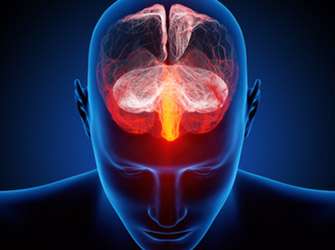'Trigger' for stress processes discovered in the brain

At the Center for Brain Research at the MedUni Vienna an important factor for stress has been identified in collaboration with the Karolinska Institutet in Stockholm (Sweden). This is the protein secretagogin that plays an important role in the release of the stress hormone CRH and which only then enables stress processes in the brain to be transmitted to the pituitary gland and then onwards to the organs. A current study on this molecular switch has now been published in the top-ranked EMBO Journal.
"If, however, the presence of secretagogin, a calcium-binding protein, is suppressed, then CRH (= Corticotropin Releasing Hormone) might not be released in the hypothalamus of the brain thus preventing the triggering of hormonal responses to stress in the body," explains Tibor Harkany of the Department of Molecular Neurosciences at the MedUni Vienna.
The hypothalamus requires the assistance of CRH to stimulate the production and release of the hormone ACTH from cells in the pituitary gland into the blood stream. Thus, ACTH reaches the adrenal cortex and once there stimulates the production and release of further hormones including, cortisol, a vital stress hormone. Upon stress, the hypothalamus responds by releasing CRH and thus produces the critical signal orchestrating also ACTH and cortisol secretion. However, if this cycle is interrupted, it is not possible for acute, and even chronic, stress to arise.
Another interesting fact: secretagogin was discovered at the MedUni Vienna 15 years ago by Ludwig Wagner at the University Department of Internal Medicine III in connection with research on the pancreas.
Therapeutic approach for stress
"Now we have a better understanding of how stress is generated," says Tomas Hökfelt of the Karolinska Institutet and guest professor at the MedUni Vienna. This could result in a further development where secretagogin is deployed as a tool to treat stress, perhaps in people suffering from mental illness such as depression, burn out or posttraumatic stress disorder, but also in cases of chronic stress brought on by pain. If a rapid recovery phase follows a period of stress, body and mind are restored to "normal working", which is associated with a suppression of the release of circulating stress hormones.
In contrast, the consequences of chronic stress are manifold and can, for example, lead to an increased tendency to suffer from infections but also to high blood pressure, diabetes and an increased risk of cardio-vascular disease right through to chronic headaches, tinnitus or osteoporosis.
Illnesses resulting from stress steadily increase in frequency and place a burden on the health care system. The European Agency for Safety and Health at Work has therefore dedicated 2014 to the subject of stress. According to the Austrian employees' organisation, international studies show that in Europe over 50 percent of sick leave is attributable to a form of stress. In a recent analysis by the Austrian Economic Research Institute, IWS, a figure of seven billion Euros a year was placed on the economic damage due to mental illness in Austria.
More information: EMBO Journal, A secretagogin locus of the mammalian hypothalamus controls stress hormone release. R. Romanov, A. Alpar, M.D. Zhang, A. Zeisel, A. Calas, M. Landry, M. Fuszard, S. Shirran, R.Schnell, A. Dobolyi, M. Olah, L. Spence, J. Mulder, H. Martens, M. Palkovits, M. Uhlen, H. Sitte, C. Botting, L. Wagner, S. Linnarsson, T. Hökfelt, T. Harkany. DOI: 10.15252/ embj.201488977 , October 2014.


















